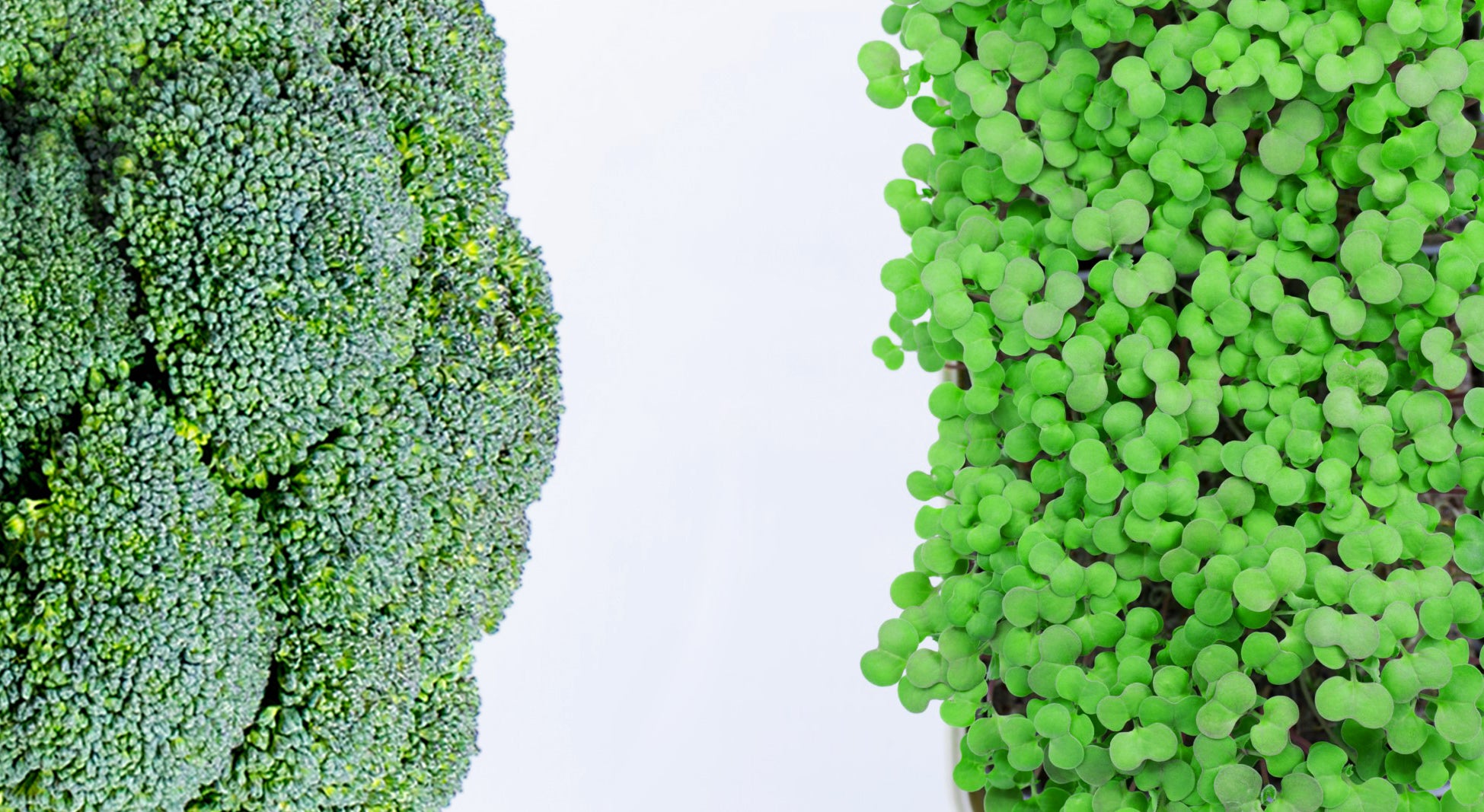
Like all great sayings, there's plenty of validity behind the "eat your broccoli' refrain. As much as our sceptic younger selves may have protested the fact, broccoli IS good for us. In addition to containing high levels of iron and vitamins A and C, broccoli is one of the foods highest in sulforaphane, the powerful antioxidant that gives the vegetable many of its health-supporting superpowers — from helping to regulate important physical functions to aiding in disease prevention and recovery.
Micro-broccoli is the latest addition to the Microdpod seed mat range. No matter your stance on the taste of broccoli, these microgreens are not to be dismissed as fun-sized clones of their mature siblings. Containing 10 to 100 times more sulforaphane than adult broccoli, the health benefits of micro-broccoli are truly unbelievable considering their tiny size. (1) Read on to find out why it pays to eat broccoli microgreens. The final reason might come as a pleasant surprise!
1. Vitamin C for immune support
Eating a diet rich in vitamin C has been shown to possibly lower oxidative stress, improve immunity, and reduce the risk of heart disease and cancer. Getting your daily intake couldn't be easier with micro-broccoli, which has vitamin C in spades, surpassing that of spinach and even lemons. (2, 3)
2. Anti-cancer properties
Studies have shown a link between eating a diet rich in cruciferous veggies like broccoli with a reduction in risk of cancer. Sulforaphane is among the compounds believed by researchers to be cancer-inhibiting, possibly through the process of increasing protective enzymes in the body. (4, 5, 6)
3. Blood sugar regulation
Sulforaphane may have positive effects on blood sugar levels in people struggling with blood sugar irregularities. In a study of 97 people with type 2 diabetes, long-term blood sugar control improved in patients within twelve weeks of daily consumption of broccoli extract containing sulforaphane. (7, 8)
4. Anti-inflammatory and heart health support
Chronic inflammation in the body can contribute to chronic pain, fatigue, lowered immunity, heart disease, and even some cancers. Sulforaphane has been found to reduce inflammation. Inflammation may lead to narrowed arteries, a primary cause of heart disease. (9, 10)
5. Anti-aging
Sulforaphane can activate heat shock proteins that impede cell aging and improve cognitive ability. Additionally, studies support sulforaphane's ability to protect against the damaging UV rays of the sun. (11, 12, 13, 14)
6. A healthy mind
Animal studies have found sulforaphane to aid in brain injury recovery. Depression and anxiety reduction were also observed. Research continues with human studies, which have been initiated following these promising results. (15, 16, 17)
7. Simply delicious
Those of you who are more easily swayed by your taste buds will be delighted to find that micro-broccoli is quite enjoyable when it comes to matters of taste. The leaves and shoots are crunchy with a fresh, subtle cabbage flavour. Thanks to their mildness, broccoli microgreens blend beautifully into smoothies and are especially tasty when piled high on a sammie or scattered through your favourite salad. The broccoli-adverse won't even realise they're eating broccoli. Everybody wins!
So go on, give broccoli microgreens a chance. We dare you not to fall in love with them! Visit here to order your broccoli seed mats and start growing your fresh broccoli microgreens!

Sources:
- https://www.cancer.gov/about-cancer/causes-prevention/risk/diet/cruciferous-vegetables-fact-sheet
- https://happydiyhome.com/cruciferous-vegetables-list/
- https://www.ncbi.nlm.nih.gov/pubmed/23631258
- https://www.ncbi.nlm.nih.gov/pubmed/22328735
- https://www.ncbi.nlm.nih.gov/pubmed/23679237
- https://www.ncbi.nlm.nih.gov/pubmed/23902242
- https://www.ncbi.nlm.nih.gov/pubmed/28615356
- https://stm.sciencemag.org/content/9/394/eaah4477
- https://www.ncbi.nlm.nih.gov/pubmed/26583056
- https://www.ncbi.nlm.nih.gov/pubmed/19729611
- https://www.ncbi.nlm.nih.gov/pubmed/20833711
- https://www.ncbi.nlm.nih.gov/pubmed/26799467
- https://www.ncbi.nlm.nih.gov/pubmed/24121007
- https://www.ncbi.nlm.nih.gov/pubmed/17956979
- https://www.ncbi.nlm.nih.gov/pubmed/28965607
- https://www.ncbi.nlm.nih.gov/pubmed/28189971
- https://www.ncbi.nlm.nih.gov/pubmed/27693416





